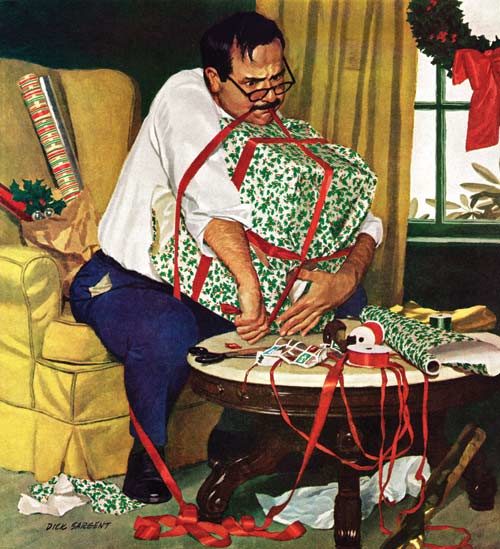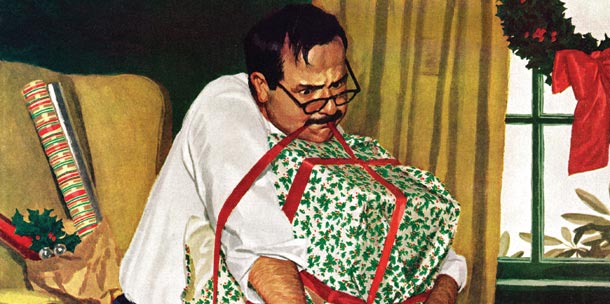
Post editors argued that we were taking the holiday way too seriously 50 years ago.
This editorial originally published December 16, 1967, as “God Rest Ye Merry”.
It is everyone’s privilege, of course, to celebrate Christmas in his own way. To some it is primarily a religious event; to others a completely secular holiday. Some regard it as a festival, others as a nuisance. Still others, not satisfied with celebrating it in their own way, annually complain at the way others celebrate it. Among these would-be legislators are those who denounce “commercialization,” those who drive around with signs that say, PUT THE CHRIST BACK IN CHRISTMAS, and those who enter into litigation about hymns and creches in the schoolroom. To these we add the voice of the former Father James Kavanaugh, who argues on page 10 of this issue, that the religious symbols of Christmas “no longer speak to me,” that “most of the past symbols are dead and the future ones have only begun dimly to live.”
Why so serious? Christmas, to begin with, is scarcely a Christian holiday at all. There is certainly no evidence that Christ was born on that day, nor was the day celebrated as such for some 300 years after His death. Instead, there were various festivals commemorating the winter solstice on December 21, and December 25 was officially decreed to be the birthday of the Unconquered Sun, climaxing the orgiastic week of Saturnalia. Teutonic and Celtic tribes added the rites of the Yule log, and the Christmas tree apparently dates from a fir tree planted by St. Boniface to replace the sacred oak of Odin in eighth-century Germany. Added to all this, from various places in various times, came Santa Claus, Good King Wenceslaus, and the office Christmas party.
It is, in short, a day of festivity and celebration, and everyone is free to celebrate whatever concerns him most, whether it be the coming of Christ or the coming of a new pair of skis. Far from “commercializing” Christmas, the merchants who sell Christmas presents, and the buyers who wrap them up and send them to one another, represent a tradition of Christmas gift-giving that is far older than its religious tradition.
And where’s the harm? It’s true that it can be annoying to have to stand in line to buy a teapot for Aunt Mathilda, and to receive, in return, a beige sweater in a size that hasn’t fit for 10 years. It’s true that after a certain number of Christmas cards have been sealed, the tongue begins to feel like a glue-factory washrag. It’s true that the bills that begin pouring in during January make one feel as though one were single-handedly buoying the national economy. Still, if there are excesses, they are excesses of giving, and while every gift may not be the purest expression of altruistic love, a dutiful gift is better than no gift, a routine card of greetings better than no card. Was it not George Bernard Shaw who responded to that foolish old saying about the impossibility of forcing people to be good by declaring that nobody was ever made good in any other way?
The more important part of Mr. Kavanaugh’s complaint deals not with commercialism, however, but with the decay of Christian symbols, and his argument reflects an increasing sense among many devout Christians that the rituals of the church have become meaningless. Behind this sense of meaninglessness lie two assumptions. The first is the assumption that such symbols as the cross or the lamb or the key or the dove once did have a meaning greater than they have today. The second is the assumption that the supposed loss of meaning is the fault of the symbol, or of the use of symbols. Neither assumption is indisputable. One suspects instead that they express a new version of the old cry, “Lord, I believe; help thou mine unbelief!”
Symbols are symbols because they express the inexpressible. Thus the lamb. Words are equally symbols. Thus the lamb is not a small white animal, but Agnus Dei qui tollis peccat mundi, and when, in search of clarification, we translate that into English, we risk a loss of meaning rather than a gain, for we risk a transformation of the magical into the mundane. Symbols do not die; what dies is our ability to use them as substitutes for reality. And in the demand for new symbols lies the hope of somehow making religion easy, the hope of somehow making it God’s duty to take part in our daily lives, rather than our duty to seek Him.
One of the curiosities of Mr. Kavanaugh’s argument is that his search for a more truly Christian Christmas leads him to a much more secular Christmas. And perhaps the only conclusion to be drawn from this is that the true meaning of Christmas can be experienced just as well in secular as in religious terms. It is, as stated in the beginning, a matter for each of us to determine for himself.
Become a Saturday Evening Post member and enjoy unlimited access. Subscribe now




Comments
If Christmas doesn’t exist to celebrate Christ’s birthday, then what is it? A season of greed, perhaps? I’m sorry I ever subscribed to this magazine. The liberal drivel comes out plainly.
If you or anyone else does not believe that Jesus was born on Dec 25 or any other day? Why then are there still paid holidays in schools, businesses, government and celebrations on TV. Taking prayer out of school because it offends someone! Not just Christmas? If Jesus was not born. Then do not give paid holidays or celebrate Easter? You can’t die if you’re not born! To die and rise from the dead in 3 days is something no MAN can do! That’s like saying our veterans did not go to war! To say that those who celebrate in their on way. “Annually complain at the way others celebrate it.” It’s not just the why they celebrate but how they or you live! God forgive us all for offending Thee! MERRY CHRISTMAS TO ALL!
No one is forcing non-believers to celebrate Christmas nor to even use the word. If people believe that it is nothing other than a hi-jacking of the Pagan feast of Saturnalia they can celebrate Saturnalia. But don’t use the term while complaining about it. The argument made that Christmas wasn’t celebrated for 300 years or more after Christ’s death ignores that it wasn’t until 313 AD that Christianity was even allowed to be practiced openly without fear of one being put to death. Finally, those who abhor the Feast of Christmas can truly ignore it by going to work on December 25.
After reading your refreshing, forthright editorial from 1967 I’m really not at all surprised by the extreme responses from far-right, fundamentalist Christians, including spineless, air-headed decisions to cancel their Post subscription — typical of their rigid, narrow-minded, intolerant, arrogant, shallow, hate-inspired thinking. Many Christians do see Christmas as strictly a celebration of the “birthday of Jesus,” but for most people, including “enlightened” Christians, Christmas means much more — a time to celebrate the wonders and joys, and yes the fun, of this one life we have to live, and to share with family and friends. It’s also a time to remember and help, in any way we can, those among us who are less fortunate. No, Christmas is not, and should not, just be about Christian religious dogma, and be so serious and downright gloomy. So yes, Merry Christmas! And thanks to the Post for being the great, special magazine that you are and always have been.
IT IS ABOUT TIME TO PUT CHRIST BACK IN CHRISTMAS. WITHOUT JESUS THERE WOULD NOT HAVE BEEN A CHRISTMAS. JESUS IS THE REASON TO CELEBRATE THE SEASON.
NO! The fact is CHRISTmas has become too SECULAR and COMMERCIAL. Mankind is trying to forget why Jesus was born. They just want the “GIFT” part of CHRISTmas.
I quote from another commentator: “Seriously????? with all you lib asses,Christmas is still trying to be dissolved.It is Jesus birthday—it is religious–duhhhh.And it will never be too religious.All you non-believers,God haters,atheists,and dumb asses—shut the hell up.Leave Christians alone and mind you own damn business.”
Surely this is a troll trying to pass themselves off as a Christian. This not how Christ or his true followers speak, write, or behave.
I think it is always idea to think, or believe what was taught to them about, the PAGAN celebration Christmas celebration as we know it today. I believe all should be looking to the Bible for the answer. If Christ had felt that it was so important to practice this. But as any Contious True Christan knows from studying the life of Jesus, He neither celebrated such NOR ask his Apostles or any of his followers to celebrate his birth. Jesus knowledge and constant references to Scripture taught him of the PAGAN celebrations then known. It was known and taught by him, to center ones attention on he true reason for his birth, was to be the Ransom, to give his PERFECT life in behalf of IMPERFECT mankind. This accomplished the whole reason for the first Bible Prophecy at GENISES 5: 1 thru 5.
FOR MANY YEARS I TREASURED MY COPIES OF THE SATURDAY EVENING POST. BUT; THANKS TO THE LIBERAL INFLUENCE I HAVE NOT, NOR WILL I READ YOUR GARBAGE AGAIN!!!!
Christmas commemorates the birth of Christ. The story of Jesus birth is celebrated on December 25. and each day of the year. Don’t know if I will be reading your magazine anymore. How liberal of you!
I guess the Political Correctness was not vogue but he or she would started the use of “Season’s Greeting!”
Boy, It is GREAT to read all the pro-Christmas comments!!
Yes, CHRISTmas is to celebrate JESUS’ birth. Whatever the date… He was born, He lived, He was crucified, and He rose again for us. He gives eternal life for all who believe in Him…and we can celebrate this all year long.
Thanks to everyone who wrote pro-Christmas comments!
Shame on you, Saturday Evening Post!
Christmas is not religious enough.What a moronic question .Get a f*”king life! We are not renewing our subscription,bye bye!
Seriously????? with all you lib asses,Christmas is still trying to be dissolved.It is Jesus birthday—it is religious–duhhhh.And it will never be too religious.All you non-believers,God haters,atheists,and dumb asses—shut the hell up.Leave Christians alone and mind you own damn business.
People keep insisting that Christmas commemorates Christ’s birth. Well, for Christians, every day can (and should, it seems) commemorate his birth. But even many Christians agree that Christ was probably born in the spring, when shepherds would have been out with their flocks, during lambing. Maybe Christians should move the celebration to the spring (alongside Easter) and avoid the debate altogether. Christ’s birth and death, of course,are part of the same work.
You can name it what you want, and, of course, celebrate as you want, but with the Christmas tree and all the trimmings, the time of year (probably not when Christ was born), and the ambiguous origins of Santa Clause and Father Christmas, it’s a repurposed pagan holiday originally meant to celebrate the return of the sun. I’m always puzzled by people who will read something like this (or did they really read or understand it?) and not “get” any of it. How can it not mean what anyone wants it to mean? I’m charmed, too, by the Nativity story (some details of which were presupposed by other “miraculous” births in earlier history), but true freedom includes the right to believe, worship, and celebrate as one wishes. True faith is not being threatened by others believing, worshiping, and celebrating differently. True intelligence is not ignoring the facts.
Although he was a deist, your founder Benjamin Franklin was a firm believer in the birth of Jesus Christ. As your founding editor in chief, I’m quite convinced that not a word of your anti-Christian Christmas drivel would have seen publication under his leadership. He would have been appalled at your flawed judgment and thinking processes, and I suspect you would have found yourself unemployed after having submitted this piece of work. While the Internet is wonderful in enabling free expression, not all freely expressed thought has redeeming value. It seems that your attempt to further de-Christianize Christmas and ignore the historic fact that Christmas is about celebrating Jesus birth has met with universal disagreement. I think this ultimately comes down to what one believes, and I would guess that you are not a believer. Just remember, Jesus was born and died for everyone… Including you! Sincerely, I wish you a merry CHRIST-mas!
MERRY CHRISTMAS !!!
The ONLY reason for Christmas is to celebrate the birth of Christ – Period.
Any other stated reason is a “shame on humanity”.
It does not matter that we do not know the exact second that he was born.
A serious occasion? Yes.
A joyful occasion? Yes.
The birth of a Savior for humanity is one to be celebrated.
When Jesus was asked to keep his disciples quiet he said “I tell you if they keep quiet, the stones will cry out.”
The root of the word “Christmas” is CHRIST. He is the center of the “holiday”. It is true that Christ/Messiah Jesus was not born on December 25th – He was born on or near September 29th. SO WHAT? The fact that He WAS born is the REAL reason for this holiday and the GIFT that was given at that birth (everlasting life through forgiveness of sin) keeps giving as long as people do NOT forget that CHRISTmas is, indeed, a very religious holiday that has become a self-centered exercise in HEDONISTIC pleasure. Mankind is always looking for ways to side-step the reality of God and His only begotten Son. CHRISTmas helps to remind us of what we are shamefully trying to forget!
There’s only ONE meaning to Christmas. It’s Jesus Christs’ Birthday. There are many non Christian business and store owners that would not be in business if it were not for Christmas. Your article says that it should be your choice to celebrate Christmas how you want to. I’m tired of people being “politically correct”. Sure it’s OK to have Santa and all the magic of Christmas, it’s fun. The bottom line of your article should be slanted towards the Jesus story. Your publication is getting more and more like The American History Channel. Maybe it’s time to cancel my subscription. Get out an old issue of The Saturday Evening Post and see how different it is and why your subscriptions were so much higher in volume. Today’s writers just don’t have it any more. Your article should be titled “Is Christmas Too Commercialized?”
As a Christian, I’d like to remind everyone, That Christmas is a holy day commemorating the birth of Jesus Christ. Over the years Commercialism has taken this Holy Day to mean Big Business Days and non Christians could not tolerate any symbolism to be shown in public places, but they apparently enjoy the gift giving and Santa Claus be cause Santas appear everywhere and they do not demand to do away with Santa. Ho Ho Ho. I still celebrate Christmas as the Holy day it is. Advent season Begins this year on December 3rd and we prepare for Christmas by lighting our Advent Candle wreath daily asking God for guidance as we do good works throughout the season. How do you prepare for Christmas?
Christmas celebrates the birth of Jesus Christ. All that was before and after
has nothing to do with the true meaning of Christmas.
I really get tired of the attempt to de-Christianize Christmas. We’re not celebrating some Druidic pre-Christian holiday, but the day when the God of the universe left heaven to be born as man on earth. While being charitable to everyone, even those who believe otherwise, spare me the Hegelian ‘thesis’–Christmas isn’t necessarily ‘Christian’, ‘antithesis’–Yes it is, ‘synthesis’–It’s whatever it means to you.
The very reason we love and resonate with Norman Rockwell art is because of America’s Christian consensus and the society that results from Christian values, even though not everyone is a believer. I don’t want what’s left of America’s Christian foundation further eroded by Post 50-year old editorials again arguing for subjective Christmas/christmas rationale that ultimately does no one any good.